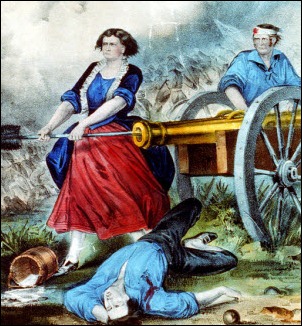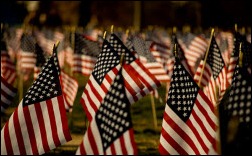The $50 billion Rural Health payout is welcome. In context, it's less than the total cost of the F22 raptor…
Curbside Consult with Dr. Jayne 7/4/11
I’m a bit of an American History devotee as well as a medical history nerd. Molly Pitcher (Mary Hays) is one of my favorite Revolutionary War heroes. Starting as a “camp follower” at Valley Forge, she worked her way from carrying water for thirsty troops to carrying water to cool hot cannon barrels between firings.
When her husband collapsed next to his cannon at the Battle of Monmouth, she took his place, ramming the barrel in between shots so that it could be loaded. Legend has it that enemy fire blew a hole in her skirt and she shrugged it off with the comment of, “Well, that could have been worse.” How can you not be in awe of a gal like that?
I hope you’re all flying your flags – I know I am. Despite all of the flaws, America is still a great place to practice medicine. We’ve come a long way from leeches and mercury to the age of wonder drugs. Sure, electronic health records are debatable, but let’s look at a few of the things we’re glad have (thankfully) gone into the history books as well as some interesting historical factoids. And as you’re reading, remember that many people around the world still live in conditions that haven’t changed much since Molly Pitcher swabbed her last cannon.
- During the Revolutionary War, soldiers were more likely to die from illness than combat. This continued pretty much until World War I, when battlefield engineers found more effective ways to maim and kill.
- There were approximately 3,500 physicians in the colonies prior to the war. Although physicians in the 1770s were highly esteemed members of society, they were taught to never question their training and the idea of testing theories (the cornerstone of today’s scientific method) was met with disdain.
- The first medical school at the Pennsylvania Hospital opened in 1768. Otherwise, physicians were trained through apprenticeships. Fewer than 300 of the physicians that served in the Revolutionary War had degrees, and those that did were mostly trained in Europe.
- The study of anatomy was optional.
- Use of leeches was common, as was treating illnesses with heavy metals such as mercury. Some physicians did pursue herbalism and remedies from Indians they encountered.
- Amputations were common as a remedy for trauma. Sterilization of equipment was unfortunately not common, leading to survival rates often less than 30%.
- Anesthesia was limited to rum, brandy, opium, and the proverbial “bite the bullet” technique.
- Smallpox may have been the first biological weapon, allegedly used by the British. The Continental Congress encouraged soldiers to take advantage of an early type of vaccination.
- General Washington doctored his troops with apple cider vinegar and honey. Although it is generally accepted that Washington died of a throat infection, it is likely that the efforts of his physicians probably sped things along with a combination of bleeding, mercury tonics, and blistering.
- The first Surgeon General of the Army, Benjamin Rush (one of five physicians who signed the Declaration of Independence) began to advocate for cleanliness as a method for preventing disease. Unfortunately, this was hard for the Revolutionary Army to accomplish.
- Physicians, notably William Cullen from Scotland, began to question whether imbalances in “nervous tension” caused disease. Stress-induced illness, anyone?
- On the home front, barely more than half of all infants made it to age six. Only 10 of every 100 made it to their mid-forties.
- Surgery for appendix removal was less than two decades old.
- Physicians had only recently recognized that citrus fruits cured scurvy.
Those who are curious can learn more about Revolutionary-era medicine by perusing Dr. William Buchan’s book Domestic Medicine. Watch out — make sure you don’t catch The Quinsey or even worse, The Gleets.
Now that you’re more than glad that you can have your gallbladder removed laparascopically or pop in to see the nurse practitioner at the local pharmacy for a script to cure your strep throat, let’s cover one tidbit that was discussed over 200 years ago yet didn’t make it into the Constitution: Medical Freedom. Benjamin Rush advocated at the Constitutional Convention:
Unless we put Medical Freedom into the Constitution, the time will come when medicine will organize into an undercover dictatorship … to restrict the art of healing to one class of men, and deny equal privilege to others, will be to constitute the Bastille of Medical Science. All such laws are un-American and despotic and have no place in a Republic … The Constitution of this Republic should make special privilege for Medical Freedom as well as Religious Freedom.
Not exactly something most of us heard about in American History class, but just as interesting a concept today as it was in 1787. So when you’re out of things to say at the family barbecue, you can feel free to throw that one out there. I guarantee the relatives that always discuss Medicare and Social Security will have a field day with that one.
Have a great recipe for red, white, and blue cocktails or a killer potato salad? E-mail me.





Based on Facebook info, not surprised you’d identify with Independence Day and ALL that it means: Happy birthday, Dr. J.
Seems like that quote isn’t as old as all that.
http://en.wikiquote.org/wiki/Benjamin_Rush
And just to try my own search:
http://www.google.com/search?tbo=p&tbm=bks&q=%22Medical+Freedom%22+inauthor:%22Benjamin+Rush%22&num=10
Anyone have a good source for where it really comes from?
As a history geek, I heartily approve of this post.
In a pinch I pulled the Benjamin Rush quote from the New World Encyclopedia but I’m pretty sure I read it originally in either The Autobiography of Benjamin Rush, The Spur of Fame: Dialogues of John Adams and Benjamin Rush, or Benjamin Rush: Signer of the Declaration of Independence. All three of these were used in a class I took and are currently gathering dust in my basement but the ease of the internet was a far stronger lure than the thought of trying to find the right box among all my books.
You know what would be cool? An app where I could scan the barcodes on my books and it would index them for me!
-J